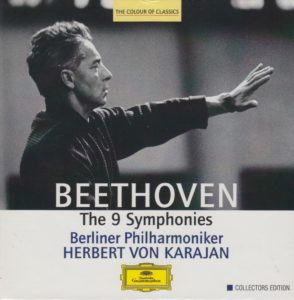
My listening post this morning overlooks the early November snow and the increasingly more iced-over lake.
Global Warming, my ass.
Anyway, as I sit here freezing my aforementioned ass off, I’m listening to Austrian conductor Herbert von Karajan (1908-1989) from his legendary 1963 Beethoven cycle, Berliner Philharmoniker, and Beethoven’s Symphony No. 7 in A major.
 I have encountered Maestro Karajan six times previously in his 1963 cycle, on…
I have encountered Maestro Karajan six times previously in his 1963 cycle, on…
Day 10. Rating: “Huzzah!”
Day 28. Rating: “Huzzah!”
Day 46. Rating: “Huzzah!”
Day 64. Rating: “Huzzah!”
Day 82. Rating: “Meh!”
Day 100. Rating: “Huzzah!”
What will Day 118 bring?
I’ll soon find out.
But first, a brief excerpt Richard Osborne’s superb liner notes:
Though the whole symphony was received with acclaim, it was the second movement, the elegiac Allegretto, which struck the most responsive chord in the minds and imaginations of the audience. It was encored and demanded de capo wherever and whenever it was played.
Like Toscanini before him, Herbert von Karajan has always had a special affection for the Sventh Symphony and a special genius in interpreting it. “Karajan’s Seventh is magnificent,” wrote the influential Record Guide of Karajan’s Philharmonia recording of the symphony.
No kidding. That’s my favorite movement, too.
But there’s that Karajan Worship Syndrome again.
 Beethoven wrote his symphonies in four parts (except for the Sixth, which is in five). The time breakdown of this particular one (Symphony No. 7 in A major), from this particular conductor (Karajan, at age 54) and this particular orchestra (Berliner Philharmoniker), at this particular time in history (March, 1962) on this particular record label (Deutsche Grammophon) is as follows:
Beethoven wrote his symphonies in four parts (except for the Sixth, which is in five). The time breakdown of this particular one (Symphony No. 7 in A major), from this particular conductor (Karajan, at age 54) and this particular orchestra (Berliner Philharmoniker), at this particular time in history (March, 1962) on this particular record label (Deutsche Grammophon) is as follows:
I. Poco sostenuto – Vivace……………………………..11:23
II. Allegretto………………………………………………………7:57
III. Presto – Assai meno presto (trio)……………….7:48
IV. Allegro con brio…………………………………………..6:36
Total running time: 33:44
My Rating:
Recording quality: 4 (slight tape hiss and ambient sounds; yet, a very fine recording despite its age of over 50 years, typically good DG-label quality)
Overall musicianship: 5 (by the book, albeit a little quick)
CD liner notes: 5 (Nice, thick 54-page booklet with lengthy essays by Richard Osborne about each symphony, translated into English, German, and French, and all pertinent technical info)
How does this make me feel: 3 (“Meh!”)
This was a tough call for me.
In many ways, this is a textbook rendition of Beethoven’s Seventh.
The orchestra is powerful and lush. I can hear its passion in a few movements, especially the fourth.
Yet, despite Karajan’s “special genius” and affinity for this symphony, I wasn’t feeling the magic.
It didn’t cause me to say, “Wow” or to feel that something special was going on, that Karajan – like Konwitschny in so many of his performances – was an inspiration for the orchestra – in this case that Karajan, the Berliner Philharmoniker, and Beethoven were one. Plus, that indefinable element that makes a performance rise above others.
Don’t get me wrong. This was a very fine performance. But it wasn’t a magical, unforgettable one. It was by the book, and little else.
I have to rate this one “Meh!”
